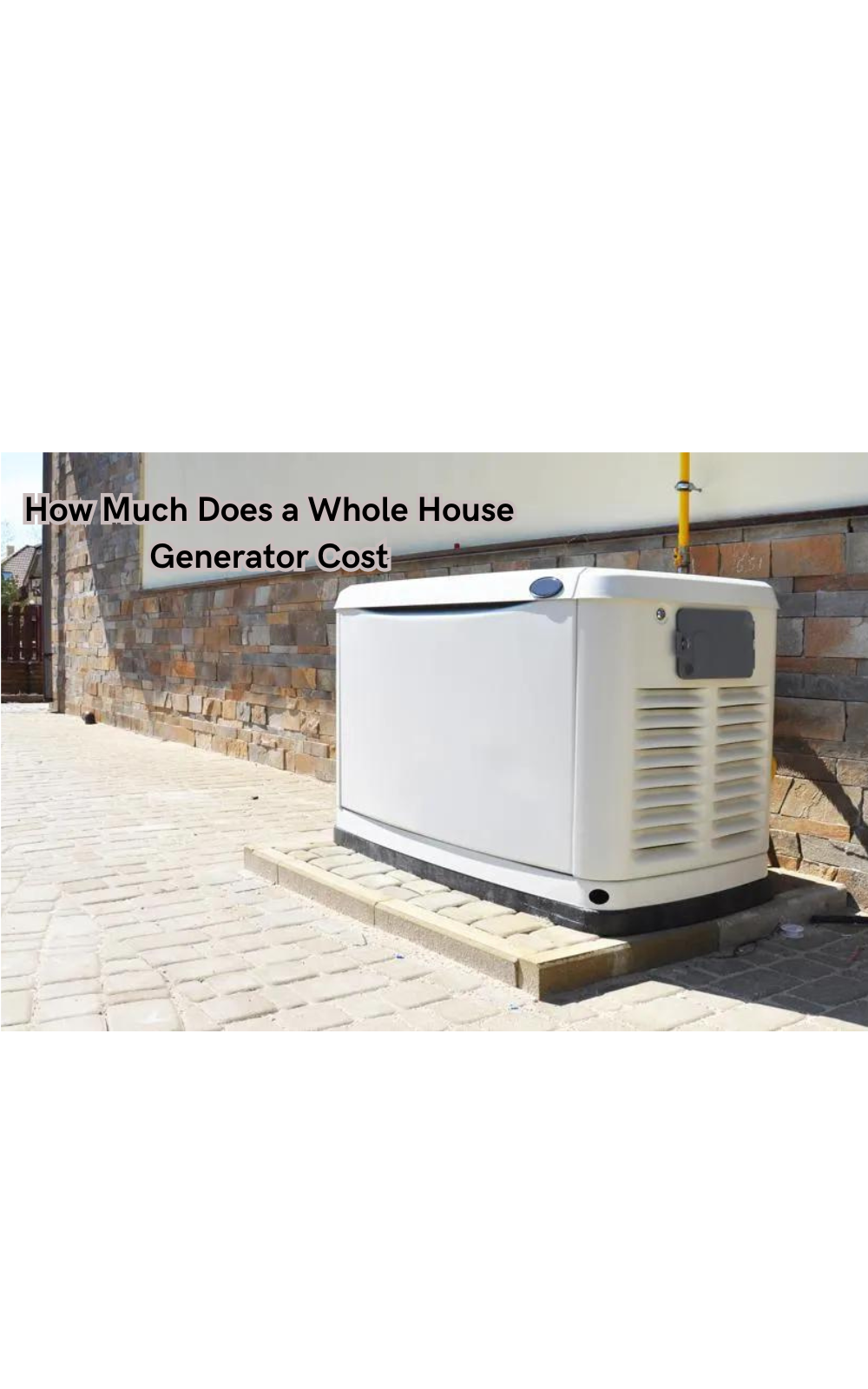How Much Does a Whole House Generator Cost
Understanding the cost implications of a whole-house generator is crucial for homeowners looking to protect their households from power outages and ensure continuous electricity supply during emergencies.

When considering the investment in a whole-house generator, one of the primary factors that homeowners evaluate is the cost associated with this essential backup power solution. The price of a whole-house generator can vary significantly depending on several key factors, including the generator's power capacity, brand, features, installation requirements, and any additional accessories or services needed.
Understanding the cost implications of a whole-house generator is crucial for homeowners looking to protect their households from power outages and ensure continuous electricity supply during emergencies.
Let's explore the typical expenses involved in acquiring and installing a whole-house generator to make an informed decision.
What is a Whole House Generator?
Before delving into the costs, it is essential to understand what a whole-house generator is and how it works.
A whole house generator, also known as a standby generator, is a permanent backup power solution that automatically turns on when there is an interruption in the main power supply. It is designed to provide electricity to your entire home and keep essential appliances and systems running during a blackout.
Unlike portable generators that need to be manually started and connected to each appliance separately, whole-house generators are permanently installed outside the home, similar to an air conditioning unit.
They are connected directly to your home's electrical panel and fueled by natural gas or propane. Portable generator prices range from $500 to $2000, whereas whole-house generators can cost anywhere from $3000 to over $20,000. Standby generators are a significant investment, but they offer the convenience and peace of mind of uninterrupted power supply during emergencies.
When Do You Need a Generator?
Power outages can happen at any time, and they can be caused by various factors such as severe weather, utility equipment failure, or accidents.
Depending on the severity and duration of the outage, it can cause significant inconvenience and disruption to your daily routine. In some cases, a power outage may even pose a safety risk for you and your family if it occurs during extreme weather conditions.
Having a whole-house generator ensures that your home remains powered during an outage, keeping essential systems like heating and cooling, refrigeration, lighting, and communication devices functioning. It also provides peace of mind knowing that you and your family are safe and comfortable during unexpected power disruptions.
Factors Affecting the Cost of a Whole House Generator
Now that we understand the importance of a whole house generator, let's take a look at the factors that influence its cost.
Power Capacity
The primary factor that influences the cost of a whole house generator is its power capacity, measured in kilowatts (kW). The higher the kW rating, the more appliances and electrical systems it can support during a power outage. Therefore, generators with higher power capacities are typically more expensive than those with lower ratings.
Brand and Features
The brand and features of a whole house generator can also impact its price. Generators from reputable brands that offer advanced features such as automatic transfer switches, remote monitoring, and multiple fuel options may come at a higher cost than basic models.
It is worth considering the long-term benefits and convenience of these additional features when evaluating the cost.
Generator Type and Size
Whole house generators come in different types and sizes, such as air-cooled or liquid-cooled. Air-cooled generators are typically less expensive than liquid-cooled ones, but they have a lower power output capacity.
The size of the generator also affects its cost, with larger units being more expensive due to the higher power output and additional materials required for installation.
Installation Requirements
The installation requirements for a whole house generator can also affect its overall cost. The complexity of the installation process, such as the need for additional wiring or concrete pads, can increase the total expenses. The cost to install a concrete pad for a whole house generator is about $375 or around $50 to $75 per square foot.
Additionally, factors such as location and accessibility may impact installation costs. It is essential to obtain quotes from licensed professionals to understand the specific installation requirements and associated costs for your home. Backup generator installation costs may differ from region to region, so it is advisable to research and compare prices from multiple service providers.
Additional Accessories and Services
In addition to the generator itself, there may be additional accessories or services needed to ensure optimal performance and safety.
These can include batteries, extended warranty plans, or regular maintenance services. It is important to factor in these costs when budgeting for a whole house generator to ensure its long-term reliability and functionality. A transfer switch is also expensive and necessary equipment for the generator installation.
Generator Cost by Fuel Type
Here is an estimate of the average cost range for a whole house generator based on fuel type and power capacity:
Gasoline:
Gas-powered generators are typically the least expensive option, with prices ranging from $500 to $4,000. However, they are also less efficient and have shorter run times compared to other fuel types.
Propane:
Propane-powered generators can cost anywhere from $2,000 to $10,000, depending on their power capacity. They offer longer run times and cleaner emissions than gasoline generators.
However, they require a larger fuel tank and may have higher installation costs. Liquid propane generators are also typically more expensive than air-cooled models.
Natural Gas:
Natural gas generators are the most expensive option, with prices ranging from $5,000 to $20,000. They offer longer run times and lower emissions but typically require professional installation and may not be available in all areas.
Diesel Fuel:
Diesel-powered generators are also a more expensive option, with prices ranging from $4,000 to $15,000. They offer longer run times and higher power capacities compared to gasoline or propane generators but may require additional maintenance.
How Much Does a Whole House Generator Cost?
After all consideration of the factors mentioned above, the average cost of a whole house generator can range from $3,000 to $15,000.
However, the final price may vary depending on your specific needs and location. It is crucial to consult with a licensed professional to assess your home's power requirements and provide an accurate estimate for installation costs.
Furthermore, it is essential to consider the long-term savings and benefits of having a whole house generator.
It can save you from potential damages and costly repairs caused by power outages, as well as provide peace of mind knowing that your home and family are protected during unexpected blackouts. Therefore, investing in a whole house generator can ultimately be a wise decision for homeowners.
Whole-House Generator Installation: DIY vs. Hiring a Professional
When it comes to installing a whole house generator, homeowners may be tempted to save money by attempting a DIY installation. However, this can be a risky and potentially dangerous decision.
Installing a whole-house generator involves complex electrical work, including connecting the generator to your home's electrical panel and wiring it to the natural gas or propane source. This requires knowledge and expertise in electrical and plumbing systems, which most homeowners may not have.
Moreover, improper installation can lead to malfunctions and safety hazards, such as electrocution or gas leaks. Hiring a professional for installation not only ensures the job is done correctly but also provides peace of mind and protection from any potential damages or accidents.
How to Save Money on Whole-House Generator Costs
While a whole house generator can be a significant investment, there are ways to save money on the overall cost. Here are some tips to help you reduce your expenses:
- Shop around and compare prices from different manufacturers and retailers. Some may offer discounts or promotions that can lower the cost.
- Consider purchasing during off-season months when demand is lower, and prices may be more competitive.
- Choose a basic model with essential features that meet your home's power needs rather than splurging on advanced and unnecessary features.
- Opt for an air-cooled generator if it is sufficient for your home's power requirements, as liquid-cooled generators tend to be more expensive.
- Hire a licensed professional who offers competitive prices and has good reviews from previous customers.
With these tips, you can potentially save hundreds or even thousands of dollars on your whole house generator cost. However, it is crucial to not compromise on quality and make sure the generator meets safety standards and your home's power needs.
FAQs
Is it worth getting a whole house generator?
Home generators cost, it ultimately depends on your specific situation and needs. If you live in an area prone to power outages or have essential medical equipment that requires continuous power, a whole-house generator can be a valuable investment for the safety and convenience of your home.
Can a generator run every day?
While it is not recommended to run a generator continuously, most modern generators are designed to handle extended use. However, regular maintenance and breaks in usage are still necessary to ensure its longevity and performance.
How long does a whole house generator last?
With proper maintenance and servicing, a whole house generator can last anywhere from 10 to 30 years. However, the lifespan may vary depending on usage and environmental factors.
How many hours can a generator run continuously?
The run time of a generator depends on its fuel capacity and load. However, most generators can handle continuous use for about 8 to 12 hours before requiring refueling or rest.
Conclusion
In conclusion, determining the cost of a whole house generator involves a complex interplay of various factors that influence the overall price tag.
While the initial investment in a whole-house generator may seem significant, it is essential to consider the long-term benefits and peace of mind it provides during power outages.
The cost of a whole house generator encompasses not only the equipment itself but also installation, maintenance, fuel source, and potential additional features for optimal functionality.
